AMD Radeon HD 7870 GHz Edition & Radeon HD 7850 Review: Rounding Out Southern Islands
by Ryan Smith on March 5, 2012 12:01 AM ESTOverclocking: Power, Temp, & Noise
As with the rest of Southern Islands, AMD is making sure to promote the overclockability of their cards. And why not? So far we’ve seen every 7700 and 7900 card overclock by at least 12% on stock voltage, indicating there’s a surprising amount of headroom in these cards. The fact that performance has been scaling so well with overclocking only makes overclocking even more enticing. Who doesn’t want free performance?
So how does Pircairn and the 7800 series stack up compared to the 7700 and 7900 series when it comes to overclocking? Quite well actually; it easily lives up to the standards set by AMD’s previous Southern Islands cards.
| Radeon HD 7800 Series Overclocking | ||||
| AMD Radeon HD 7870 | AMD Radeon HD 7850 | |||
| Shipping Core Clock | 1000MHz | 860MHz | ||
| Shipping Memory Clock | 4.8GHz | 4.8GHz | ||
| Shipping Voltage | 1.219v | 1.213v | ||
| Overclock Core Clock | 1150MHz | 1050MHz | ||
| Overclock Memory Clock | 5.4GHz | 5.4GHz | ||
| Overclock Voltage | 1.219v | 1.213v | ||
Overall we were able to push our 7870 from 1000MHz to 1150MHz, representing a sizable 15% core overclock. This is now the 3rd SI card we’ve hit 1125MHz or 1150MHz – the other two being the 7970 and the 7770 – so AMD’s overclocking headroom has been extremely consistent for their upper tier cards.
As for memory overclocking, we hit 5.4GHz on both cards before general performance started to plateau, representing a 12.5% memory overclock. Considering that both cards use the same RAM on the same PCB, and the performance limitation is the memory bus itself, this is consistent with what we would have expected. With that said, we are a bit surprised that we got so far over 5GHz on 2Gb GDDR5 memory chips only rated for 5GHz in the first place; it indicates that Hynix’s GDDR5 production very mature.
With that said, because of the unique and non-retail nature of the 7850 AMD supplied us, the 7850 overclocking results should be considered low-confidence. The retail 7850 cards will be using simpler and no doubt cheaper coolers, PCBs, and VRMs; all of these can reduce the amount of overclocking headroom a card has. It’s by no means impossible that a 7850 could hit 1050MHz/5.4GHz, but it’s far more likely on a 7870 PCB than it is on a 7850 PCB.
Anyhow we’ll take a look at gaming performance in a moment, but in the meantime let’s take a look at what our overclocks do to power, temperature, and noise.
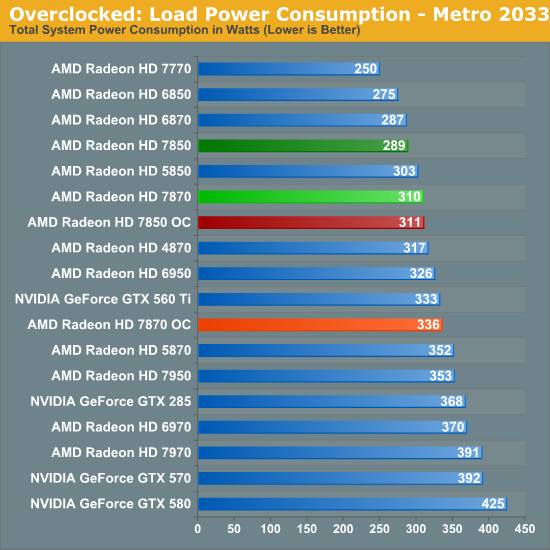
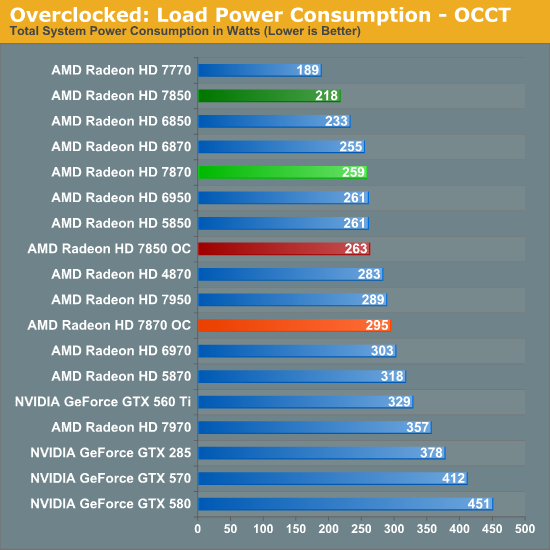
Even without a voltage increase overclocking does cause power consumption to go up, but not by a great deal. Under Metro the total difference is roughly 21W for the 7850 and 25W for the 7870, at least some of which can be traced back to the increased load on the CPU. Whereas on OCCT there’s a difference of nearly 40W on both cards, thanks to the increased PowerTune limits we’re using to avoid any kind of throttling when overclocked. All things considered with our overclocks power consumption for the 7850 approaches that of the 7870 and the 7870 approaches the GTX 560 Ti, which as we’ll see is a fairly small power consumption increase for the performance increase we’re getting.
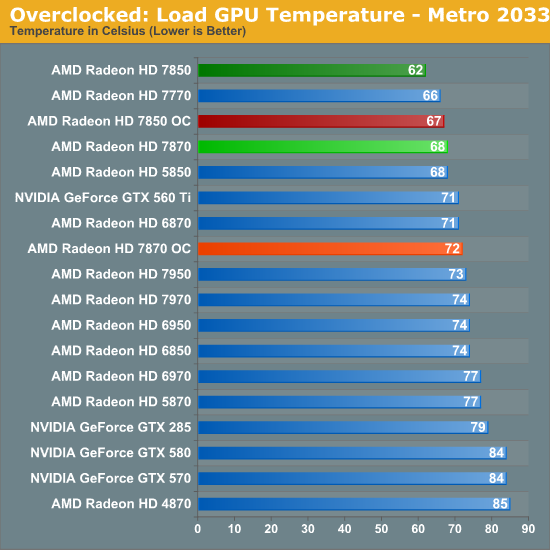
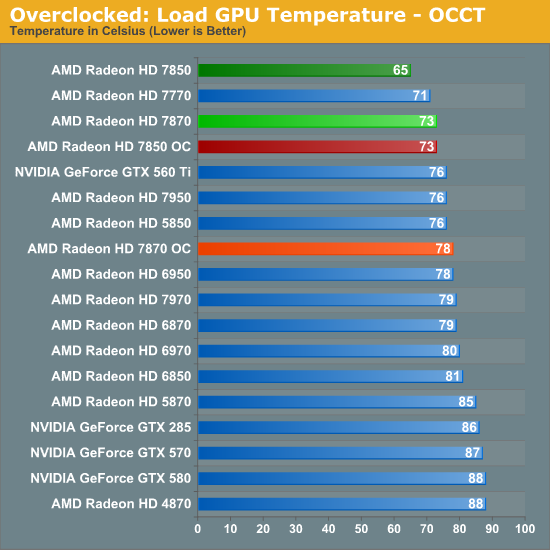
Of course when power consumption goes up so does temperature. For both cards under Metro and for the 7870 under OCCT this amounts to a 5C increase, while the 7850 rises 8C under Metro. However as with our regular temperature readings we would not suggest putting too much consideration into the 7950 numbers since it’s using a non-retail design.
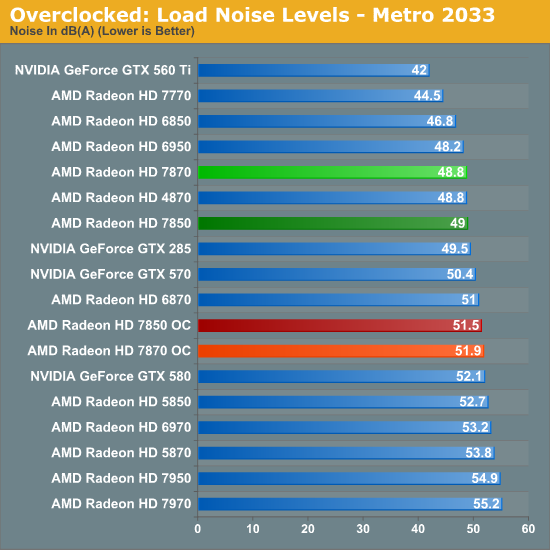
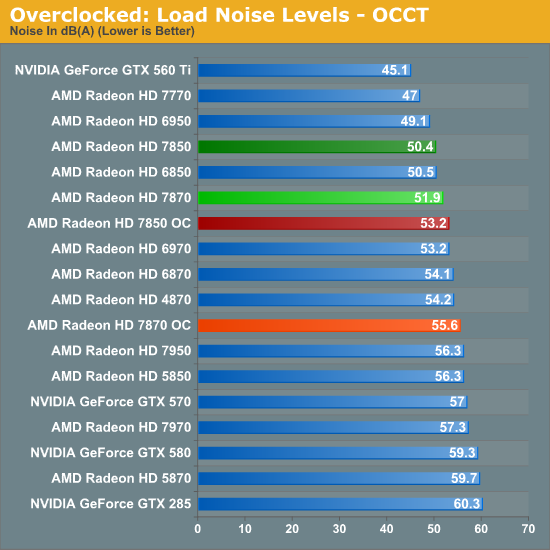
AMD’s conservative fan profiles mean that what are already somewhat loud cards get a bit louder, but in spite of what the earlier power draw differences would imply the increase in noise is rather limited. Paying particular attention to Metro 2033 here, the 7870 is just shy of 3dB louder at 51.9dB, while the 7850 increases by 2.7dB to 51.5dB. OCCT does end up being worse at 2.8dB and 3.7dB louder respectively, but keep in mind this is our pathological case with a much higher PowerTune limit.










173 Comments
View All Comments
Kaboose - Monday, March 5, 2012 - link
7870, beats GTX 570 and is about even with the GTX 580, uses 150watts less power at load, is quieter, is cooler, and has idle power draw > 23watts less. How is this a disappointment? The only disappointment i see is the price which is the result of no competition from Nvidia.Kiste - Monday, March 5, 2012 - link
A new generation of GPUs used to give us a whole hell of a lot more performance at any given price point. The current AMD stuff does not and that is a disappointment.Case in point: you even have to talk these things up by basically saying "oh, well, at least they draw less power".
Kaboose - Monday, March 5, 2012 - link
dropping power consumption by over 50% is something of a gimmick? Dropping load temps by 14c compared to the GTX 570 is not significant? 14c is a fairly large degree of deference, this gives higher room for overclocking as well as a cooler system overall. When Nvidia releases Kepler and we have both companies with 28nm then we can (hopefully) see some competition in price. In my opinion the 7870 at $325 would be a great card right now. Once Kepler is out $285-300 I think would be nice. I agree it is over priced right now however.If Nvidia releases Kepler and gives us a LOT more performance over last generation then I will concede that the 7xxx series is a failure. However from the way AMD is behaving it doesn't appear Kepler is going to do much in terms of raw performance either.
Kiste - Monday, March 5, 2012 - link
While reducing power consumption might not be a gimmick, it is the result of the new process node and thus in itself not particularly impressive, especially when you more or less keep the performance the same as with the previous generation.I'm still not impressed, sorry. Price/performance plain and simply sucks ass with these cards, barely beating the stuff that's on the market right now in that regard.
And even with the high-end SI cards there's barely much of a performance boost compared to what's already been on the market for months.
Sure, less power draw is nice. I won't complain about it but if a brand new generation of GPUs comes out and I am not even one little bit compelled to upgrade from my aging, heavily overclocked GTX570, then something is cleary wrong here.
Exodite - Monday, March 5, 2012 - link
We'll just have to wait and see what Nvidia provides when they finally decide to put competition on the market, won't we?I'd happily agree to finding the 7900-series not as high-performing as I'd like, and the 7700-series too expensive.
From the reviews I've read so far the 7800-series, the 7850 especially, is pretty much the perfect card ATM.
Low power, low noise, cool, 2GB VRAM and runs between a 560 Ti and 570 in performance.
It's definitely the card I'd recommend to anyone at this point, especially given the fact that we'll see better coolers than AMDs atrocities once we get release versions.
Iketh - Monday, March 5, 2012 - link
You must live in a cold climate. You're happy with a heavily overclocked 570?? I live in FL, and that card increases my power bill $30-$70 each month over my 6870 during 3 of the 4 seasons, and I'm talking from experience. Do you have any idea how hard an A/C has to work in a small 2 bedroom house to counter the blast of heat from an overclocked gaming rig??If you live in a hot climate, test it for yourself.
You don't compare just the power draw of the cards themselves....
Kiste - Monday, March 5, 2012 - link
I'm not quite sure if you're actually expecting a serious answer to that kind of hyperbolic drivel.Jamahl - Monday, March 5, 2012 - link
You really don't get it do you? These cards REALLY DO heat up rooms. Where do you think the heat goes? Ever heard of the law of conservation of energy?londiste - Monday, March 5, 2012 - link
oh damn, i need to get two of those, maybe they'll reduce my heating bill at winter :)Kiste - Monday, March 5, 2012 - link
Spelling "really do" in capital letter doesn't make it any more less ridiculous a statement.My whole PC (GPU, OCed CPU, 4 HDDS) draws slightly more than 300W under typical gaming loads. You can't "heat up a room" with that, much less with just the GPU.